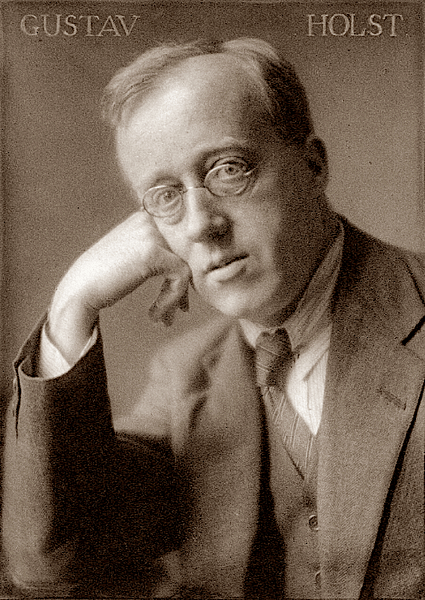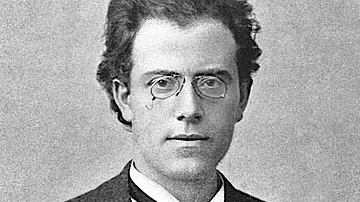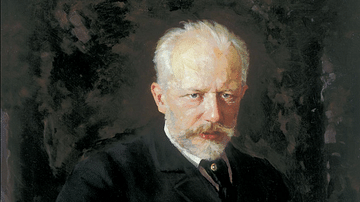
Gustav Holst (1874-1934) was a British composer of Swedish origin most famous for his dramatic orchestral suite The Planets, first performed in public in 1919. Holst also composed several operas, wrote sacred choral works such as The Hymn of Jesus, and was a dedicated collector of folk songs.
Early Life
Gustav Holst was born in Cheltenham on 21 September 1874, where his parents, who were of Swedish descent, had set up home. Gustav's father was an organist and piano teacher in Cheltenham. Gustav continued the family interest in music, learning piano and also conducting the local choir. His musical talent shone through, and in 1895, Gustav won a scholarship to study at the Royal College of Music in London. The Holst family had only modest means, and the scholarship – won at the second attempt – was a necessity for Gustav to widen his music education. He studied to play the trombone, an instrument he would use to eke out a living, teaching others to play the instrument and performing as part of seaside brass bands and as a member of the orchestra at the Carl Rosa Opera in London.
After graduation, Holst became a general music teacher in London. In 1903, Holst moved to Dulwich where he taught music at a girls' school, a position he would hold until 1920. In 1905, Holst also became the director of music at the St. Paul's School for Music in Hammersmith. Holst was certainly dedicated to teaching; he remained at St. Paul's for the rest of his life, but other teaching positions he held simultaneously included the music directorship at Morley College for Working Men and Women in London (1907-24) and a professorship of music at Reading University. In addition, Holst found time to return and teach composition at the Royal College of Music.
Musical Influences
Holst began to compose seriously in the first decade of the 20th century, usually working in his rooms at the St. Paul's School. Holst did not have a lot of non-teaching time in which to compose, but he dedicated weekends and school holidays to this side of his career. Holst once stated, "Never compose anything unless the not composing of it becomes a positive nuisance to you" (Wade-Matthews, 444). Holst was particularly influenced by English folk music, best seen in the orchestral suite A Somerset Rhapsody, completed in 1907. Influences on Holst from other composers include the dramatic and highly innovative works of Igor Stravinsky (1882-1971) and Arnold Schoenberg (1874-1951).

Another lasting area of interest for Holst was mysticism and ancient religious ideas from the Indian subcontinent, themes which can be seen in many of his choral works and operas like Sāvitri (composed in 1908 but not performed until 1916). Holst's first success in 1905 was the religious-inspired The Mystic Trumpeter, which was performed in London's Queen's Hall. Holst learnt to read Sanskrit, which allowed him to take elements of hymns from the Rig Veda, one of the four sacred Hindu texts that constitute The Vedas, and set these to music for an orchestra and choir. Between 1908 and 1912, the composer created four groups of songs nowadays collectively titled Choral Hymns from the Rig Veda.
Holst married and set up the family home in Richmond. His daughter, Imogen, was born in 1907, and she went on to become a well-known composer in her own right. In 1908, the family moved to Barnes in South London. Interests outside music besides mysticism included astrology. Holst became an ardent student of the subject, and his good friend, the author Clifford Bax (1886-1962), noted that Holst "became a skilled reader of horoscopes" (Burton). This hobby was perhaps an exception to the composer's rule that "I only study things that suggest music to me" (ibid), although even here, the importance of planetary movements to astrological predictions creates an obvious connection with the composer's most famous work of all, The Planets.
The Planets
The Planets is Holst's masterpiece, a seven-movement orchestral suite. It was composed between 1914 and 1916 in the middle years of the First World War (1914-1918).
The seven movements, all titled after gods and goddesses from Roman mythology, are:
- Mars, the Bringer of War
- Venus, the Bringer of Peace
- Mercury, the Winged Messenger
- Jupiter, the Bringer of Jollity
- Saturn, the Bringer of Old Age
- Uranus, the Magician
- Neptune, the Mystic
The suite has a "remorseless five-in-a-bar rhythm" (Sadie, 339), and the entire work is scored for a gigantic orchestra to create a sometimes overwhelming wall of sound. The movements alternate in terms of contrasting styles, most clearly and dramatically heard in the opening and second movements. Mars and Venus are complimentary gods in mythology (and also in astrology), and here Holst contrasts the relentless drama of warfare with the almost dream-like peace which follows such turmoil. In the same vein, the Mercury and Jupiter movements are contrasting scherzos, the first extremely lively and recalling the often-used description of Mercury in antiquity as 'fleet-footed'. The second scherzo has a much more sober musical progression to remind of a distinctly regal Jupiter, the king of the Roman gods who here reigns in the central position of the suite. Holst's personal favourite movement was Saturn, named after the god associated with the passing of time. The final two movements address the end of the natural life cycle and present a characteristically ambiguous finale, which, with its innovative use of the chorus, contemplates infinity. According to the Classical Music Encyclopedia, Holst uses the human voice here in a highly unusual way, "merely as a sonority" to give an "ethereal effect" (Sadie, 339). As J. Caldwell noted, the piece's popularity has "tended to obscure its utter originality" (quoted in Steen, 874).
The Planets was first performed in 1918 in front of a private audience and was unleashed on the public the following year, although the Venus and Neptune movements were omitted. The first public performance was conducted by Adrian Boult (1889-1983). The first performance of all seven movements together came in 1920. At last, Holst was recognised as a composer of note. The Mars movement later became especially popular in soundtracks for film and television and was notably used as the theme tune for the 1950s science-fiction television series The Quartermass Experiment. In contrast, part of the music from the Jupiter movement was reused for the hymn I Vow to Thee, My Country with lyrics by Cecil Spring Rice.
Other Works
After the success of The Planets, Holst moved deeper into mysticism, as seen in such works as The Hymn of Jesus (considered his choral masterpiece) and Ode to Death (composed in 1917 and 1919, respectively), both sacred works for chorus and orchestra. Holst continued to write operas such as the one-act comedy The Perfect Fool, first performed in 1923 in Covent Garden, London. Holst wrote both the music and the libretto, and he adapted the ballet music from the opera into a stand-alone orchestral work. There was, too, the Falstaffian opera At the Boar's Head, first staged in Manchester in 1925, and The Wandering Scholar, which premiered in Liverpool in 1934.
Holst's symphonic poem Egdon Heath, composed in 1927, was inspired by the 1878 novel The Return of the Native by Thomas Hardy (1840-1928). Holst even subtitled his poem Homage to Hardy. Illustrating Holst's growing international reputation, the work was commissioned and then first performed by the New York Symphony Orchestra in 1928.
Holst wrote for other genres, notably works for brass bands, like A Moorside Suite (1928) and his Hammersmith (1930-31), a scherzo for military bands. He wrote suites for strings such as St. Paul's (1913) – which was designed to be played by a youth orchestra – and Brook Green (1933), and two Concerts for Violin. Holst was certainly versatile and even composed the Christmas carol In the Bleak Mid-Winter with lyrics from a poem by Christina Georgina Rossetti. The carol first appeared in 1906. Holst was also greatly interested in folk music and became a dedicated collector and cataloguer of folk songs, an enterprise he conducted with fellow composer Ralph Vaughan Williams (1872-1958). Holst and Williams had become friends when they were both students at the Royal College of Music. In 1929, Holst set 12 poems by Humbert Wolfe to music, and in 1930-31, he repeated the idea using 12 Welsh folk songs.
Holst's Major Works
The most important works composed by Gustav Holst include (with composition dates noted in brackets):
A Somerset Rhapsody – orchestral suite (1906-7)
Sāvitri – opera (1908)
St. Paul's – suite for strings (1913)
The Planets – orchestral suite (1916)
The Hymn of Jesus (1917)
Ode to Death (1919)
The Perfect Fool – opera and ballet music (1922)
Fugal Concerto (1923)
At the Boar's Head – opera (1924)
Choral Symphony (1925)
Egdon Heath – symphonic poem (1927)
A Moorside Suite – suite for brass band (1928)
Concert for Two Violins (1929)
The Wandering Scholar – opera (1929-30)
Hammersmith – scherzo for military band or orchestra (1930-31)
Choral Fantasia – for soprano, chorus, organ, and orchestra (1930)
Brook Green – suite for strings (1933)
Lyric Movement – suite for viola and chamber orchestra (1933)
Death & Legacy
Holst experienced some health problems from the 1920s onwards: "he suffered from poor eyesight and neuritis in his arm, and his health was further affected by a fall in 1923" (Arnold, 871). These problems had a direct consequence on how Holst composed his music, as the music critic Michael Kennedy explains:
The effect on his music was that it was pared to the bone: the effort of writing it down compelled an artistic economy which some felt was carried too far…the austere bitonality of the Fugal Concerto (1923) and the Double Concerto for two violins (1929) puzzled even his admirers. (ibid, 871)
Gustav Holst died in London on 25 May 1934 after undergoing a surgical procedure for haemorrhagic gastritis. Not only did Holst's work influence fellow composers such as Benjamin Britten (1913-76) and Michael Tippett (1905-88) but the composer had also inspired countless students, as explained by Kennedy:
It would be difficult to exaggerate his influence as a teacher with a genius for encouraging amateurs and beginners to strive after the highest and most uncompromising standards. This integrity is reflected in some of the choral works he wrote for his pupils to sing, often demanding a subtlety and discipline which would tax professionals.
(ibid, 871)







